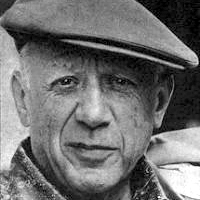Pablo Picasso Frases famosas
“Não se pode fazer nada sem a solidão.”
Nada puede hacerse sin soledad
citado em Punta Europa: Volume 2,Edições 18-24 - página 154, Vicente Marrero Suárez - 1957
Atribuídas
Pablo Picasso frases e citações
Pablo Picasso citado em "Quando a Psicoterapia Trava - Página 69, Marina da Costa Manso Vasconcellos, Grupo Editorial Summus, 2007, ISBN 8571830312, 9788571830318 - 216 páginas
“Não há, na arte, nem passado nem futuro. A arte que não estiver no presente jamais será arte.”
Il n'y a, en art, ni passé, ni futur. L'art qui n'est pas dans le présent ne sera jamais.
Pablo Picasso citado in La Revue de France - Volume 11 - Página 117, Marcel Prévost, Joseph Bédier, Raymond Recouly - La Renaissance du livre, 1931
Atribuídas
“Eu não fiz, vocês é que fizeram, eu só pintei.”
resposta de Picasso.
Conta-se que, em 1940, com Paris ocupada pelos nazistas, um oficial alemão, diante de uma fotografia reproduzindo o painel, perguntou à Picasso se havia sido ele quem tinha feito aquilo. O pintor, então, teria respondido com a frase acima.
Atribuídas
“Quando dizem que sou demasiado velho pra fazer alguma coisa procuro fazê-la em seguida.”
Cuando me dicen que soy demasiado viejo para hacer una cosa, procuro hacerla enseguida.
citado em Psiquiatría geriátrica - Página xxi, Luis Agüera Ortiz, Jorge Cervilla Ballesteros, Manuel Martín Carrasco - Publicado por Elsevier España, 2006, ISBN 8445815792, 9788445815793 - 1048 página
Atribuídas
“A inspiração existe, mas tem que te encontrar trabalhando.”
Cambio 16: Edições 884-887, Informacion y Publicaciones, S. A., 1988
Atribuídas
pergunta de um oficial nazista mostrando uma foto do painel Guernica à Picasso.
Atribuídas
“Cézanne é o pai de todos nós.”
Fonte: Site do UOL, num artigo referente aos 100 da morte de Cézanne http://diversao.uol.com.br/arte/ultnot/2006/01/26/ult32u13181.jhtm, publicado no dia 26 de Janeiro de 2006, às 15h23.
“Copiar outras pessoas é necessário, mas copiar a si mesmo é patético.”
To copy others is necessary but to copy oneself is pathetic
Picasso citado em Nation - Edições 1-33 - Página 64, 1958
Atribuídas
“Se sabemos exactamente o que vamos fazer, para quê fazê-lo?”
Si se sabe exactamente lo que se va a hacer. ¿Para qué hacerlo?
citado em Picasso íntimo: 1971 noventa años, Antonio D. Olano - 1971 - 351 páginas
Atribuídas
Pablo Picasso: Frases em inglês
“Inspiration exists, but it has to find you working.”
La inspiración existe, pero tiene que encontrarte trabajando.
Attributed from posthumous publications
Fonte: Tomás R. Villasante (1994), Las ciudades hablan: identidades y movimientos sociales en seis metrópolis latinoamericanas. p. 264.
“Bad artists copy. Good artists steal.”
Compare: "Immature poets imitate; mature poets steal." T. S. Eliot, in Philip Massinger, in The Sacred Wood (1920)
Disputed
Variante: Good artists copy, great artists steal.
Fonte: 1920s, "Picasso Speaks" (1923), p. 315.
Herschel Browning Chip (1968, p. 270).
Other translation:
Abstract art is only painting. And what's so dramatic about that? There is no abstract art. One must always begin with something. Afterwards one can remove all semblance of reality.
Richard Friedenthal (1968, p. 256-7).
Longer version:
Abstract art is only painting. And what's so dramatic about that? There is no abstract art. One must always begin with something. Afterwards one can remove all semblance of reality; there is no longer any danger as the idea of the object has left an indelible imprint. It is the object which aroused the artist, stimulated his ideas and set of his emotions. These ideas and emotions will be imprisoned in his work for good.. .Whether he wants it or not, man is the instrument of nature; she imposes on him character and appearance. In my paintings of Dinard, as in my paintings of Purville, I have given expression to more or less the same vision.. .. You cannot go against nature. She is stronger than the strongest of men. We can permit ourselves some liberties, but in details only (Boisgeloup, winter 1934).
As quoted in Futurism, ed. Didier Ottinger; Centre Pompidou / 5 Continents Editions, Milan, 2008, p. 313
Quotes, 1930's, "Conversations avec Picasso," 1934–35
Contexto: Abstract art is only painting. What about drama?
There is no abstract art. You always start with something. Afterward you can remove all traces of reality.
“[Speaking of computers] But they are useless. They can only give you answers.”
As discussed in this entry from Quote Investigator http://quoteinvestigator.com/2011/11/05/computers-useless/#more-2932, the origin seems to be the article "Pablo Picasso: A Composite Interview" by William Fifield which appeared in The Paris Review 32, Summer-Fall 1964, and collected a number of interviews Fifield had done with Picasso.
Common later variant: "Computers are useless. They can only give you answers." This variant seems to have arisen in the 1980s, the earliest known appearance in a book is Herman Feshbach, "Reflections on the Microprocessor Revolution: A Physicist's Viewpoint", in Man and Technology (1983), ed. Bruce M. Adkins, where the attribution is described as "rumoured". http://books.google.com/books?id=9EohAQAAIAAJ&q=Picasso
1960s
Picasso quoted in 'TIME'; quoted in: The Atlantic, Vol. 214 (1964), p. 97.
Picasso commented on his ambiguous style, or use of multiple styles.
1960s
“When I don't have red, I use blue.”
Pablo Picasso (1953); quoted in: Kilkenny (2004), Doomsday Marauders, p. 83.
1950s
Quoted in: Ann Livermore (1988), Artists and Aesthetics in Spain. p. 154
Attributed from posthumous publications
Quoted in Letters of the great artists – from Blake to Pollock, Richard Friedenthal, Thames and Hudson, London, 1963, p. 258 (translation Daphne Woodward)
1960s
“The smell of opium is the least stupid smell in the world.”
Quote, attributed to Picasso in: Jean Cocteau (1932), Opium: The Diary of an Addict. p. 63
Quotes, 1930's
